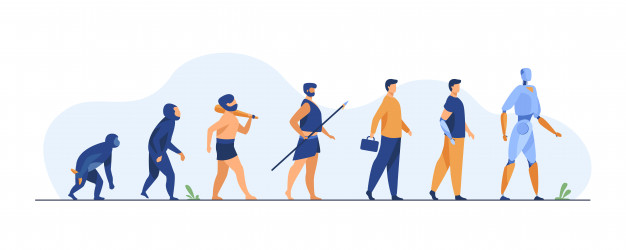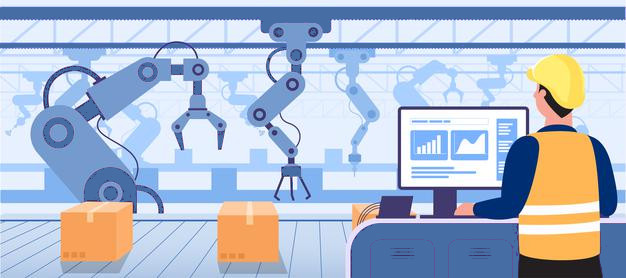
Digital revolution
"The science of today is the technology of the future." ~ Edward Teller
We are witnessing a truly exciting stage in human existence, and we are at the very threshold of great changes the likes of which we do not remember in recent history. The Industrial Revolution once replaced manual production with steam machines, raising the production capacities of the time, but what is coming now has the potential to change the social order even more radically in economic, capitalist, and social terms. Of course, we are talking about the term "digital revolution", whose beginnings go back to the early 80s of the last century, and the main characteristic of the period in question is the mass production and wide use of digital logic circuits and its derived technologies. Some call it the third industrial revolution, but regardless of the terminology, it is only certain that it will change the understanding of work, the market, and the world in general.
But what specifically awaits us in the coming decades? It's hard to be sure. The very fact that a good part of the previous predictions turned in a completely wrong direction shows how ungrateful the forecasts are and how fast the changes are, but some outlines of the future of the labor market can still be seen.

The fact that leading experts say that 65% of children today will work in jobs that currently do not exist at all, and that half of all jobs today will disappear by 2030, is fascinating. This is a truly radical idea for a relatively short period if we take into account estimates that the number of people on Earth will continue to grow (almost 10 billion by 2050). Predictions say that almost two billion people could be left without their current occupations, which in itself should not be a problem if society and the ruling elites manage to find a solution for this large workforce whose occupations will, by all accounts, become a relic of the past. Even with timely planning and targeted retraining, the number of current jobs will be difficult to replace.
The reason for this will be changes in the current main industrial branches, which will systematically change. The future obviously brings technological progress in which modern inventions perform human tasks more and more effectively, and this means that the demand for labor will decrease in certain sectors that have adapted to new achievements. It is therefore quite logical to expect the unstoppable growth of information technology, alternative energy sources, global trade, and mechanization.
THE ARRIVAL OF THE ROBOTS
What comes to mind for a good part of the population when robots are mentioned are scenes from Terminator. But the fact is that fears of evil robots are still in the domain of science fiction and we are far from a state where robots have such awareness and power that they decide to defy their creators and take over the world. Although the biggest advances in the field of robotics are yet to be seen, robots have been with us for some time.
We have the opportunity to see them in use in production, the auto industry, the military industry, and many other branches. Robots are also with us in space, during space missions. Skeptics point to a certain fear that robots, as well as advanced inventions and computers, could take over a large number of jobs in the future, and that they will become a major competitor for workers.
This fear is certainly not unjustified, since predictions indicate that the 'technical potential' for automating the type of jobs that do not require high qualifications is on average five times greater than in the category of jobs that require a high degree of expertise, and which are very few in the final statistics. In addition to all that, futurologists expect that by the end of the century, robots will become more intelligent and effective than people themselves!
However, we still have a long way to go to that point of technological singularity, so the current ones are usually relatively simple systems that perform individual tasks that require a high degree of effectiveness and are unpleasant or dangerous by nature. It will be interesting to observe the progress of our mechanical friends in the coming years, but their business path will follow that of humans themselves - as time goes on, their evolution will allow them to deal with more complex and demanding jobs.
THE GROWTH OF THE GIG / SHARE ECONOMY

Most of us grew up with parents who usually had one or two jobs where they spent their entire working life. Today's market is fundamentally different from those times, and the future will seem to look at the lives of previous generations as an unimaginable state of the new zeitgeist.
It is to be expected that in the future the working life of an employee in one company will be much shorter than it is today, and an example of a career based on only one position or one company will be a real rarity.
The working environment in the future will therefore be additionally exposed to flexible working hours and tasks, which will go hand in hand with the way of life itself. The line that separates private from business is getting thinner.
In this direction, experts agree, there will be an era that will be characterized by people performing multiple jobs at once. This will greatly affect the growth of the so-called gig economy, the description of which would correspond to an environment in which temporary work positions are a dominant phenomenon and in which organizations contract jobs with independent workers for short-term engagements.
This also implies that concepts such as outsourcing and freelancing will become more and more prevalent, as well as the strengthening of mass organizational systems such as Uber, Airbnb, and others that aim to directly exchange goods or services without intermediaries.
HUMANITY AS A COMPETITIVE ADVANTAGE

As we can see, what people certainly cannot match their technological inventions with is round-the-clock work, constant availability, productivity, and absence of complaints. A machine whose sole purpose and role is the work it performs will become an increasingly available option, bearing in mind mass use and price collapse.
So how do you qualify for these terrible machines? The key is very simple - to be human. Human abilities such as emotional intelligence, seeing the bigger picture, leadership, motivation, compassion, and adaptation will be at the very throne of prestigious competencies that will create dominance in a system built on innovation and productivity.
To adapt to that environment, a person's soft skills will be of great importance and will decide how competent and competitive a person will be in the business opportunities of the future. These soft skills are social intelligence, distinguishing key data, systematic thinking, communication, empathy, flexibility, creativity, etc.
As computers become more advanced and capable over time, it is logical that people will invest their efforts in the aforementioned human abilities, and others will leave jobs to machines that were created for specific tasks.
Although some believe that in the future, technology could replace humans to a greater extent in all automated jobs, robots will still not be sophisticated enough for empathy and interpersonal communication, and thus humans will be irreplaceable. Although this applies to all types of personal services, the example of medicine is significant.
The age structure affects the socio-economic development of the population, and of the global aging of Western civilization and the increase in life expectancy, there is an increasing need for medical employees and caregivers.
THE FUTURE IS NOW

Automated cars already exist today, and experts predict fully autonomous vehicles on the road and in mass production before 2022. Drones are an everyday occurrence, and their commercial use for transportation is at an increasingly certain stage. It is expected that the spread and availability of 3D printers will greatly disrupt some branches of production - especially highly complex and personalized products.
This will especially apply to medicine and related sectors.
The energy transition to renewable sources and decentralized systems will represent a combination of necessity and long-term financial profitability, and sustainable development linked to recycling and waste management will be the standard. Space tourism is also increasingly certain, and after a certain time, it will become available to those with a more modest financial situation.
Man's journey into outer space is not a new phenomenon, but with the advancement of technology, his path will lead him to hitherto unimaginable destinations. Although artificial intelligence has been around for a long time, today it is mostly still in the domain of narrow or weak AI, which means that it is designed for the realization of a simple or narrow task, such as facial recognition or driving a car.
What artificial intelligence will strive for in the future is a new standard based on the principles of strong or artificial general intelligence. While the first category outperforms humans in any specific task (e.g. playing chess), Artificial general intelligence (AGI) would be superior to humans in almost any cognitive task.
The emergence of cyborgs is also quite realistic, although emergence may not be the right word. Technically speaking, cyborgs are already among us. If their definitions are equal to an organism consisting of artificial and natural parts, or an organism that has improved characteristics thanks to technology, then it is not pretentious to say that a cyborg is also a person with an implanted pacemaker and even with contact lenses.
Virtual avatars - the description of a virtual simulation of a human being is already being tested today for wide use in the circles of customer services and information technologies. At a certain level of progress, their application will be extended to other branches such as banking, catering, and the military industry.
If we take into account the growth of virtual and augmented reality and the possibilities that it brings, we see that the border between the real and the virtual is shrinking.
Geoengineering, genetic engineering, blockchain, and machine learning are just some of the terms whose potential will be fully expressed in the future. The world used to be a big and unexplored place, but technological advances have made it smaller, safer, and more connected.
We can turn even the wildest dreams of previous generations into reality, so the conclusion is that everything that seems impossible to us, as witnesses of the current time, will one day become tangible everyday life.
With all that has been said, it seems likely that the path of man as a being will focus on creative, creative, social, and intellectual business aspirations, which is the path of innovation and realization of unimagined possibilities.



